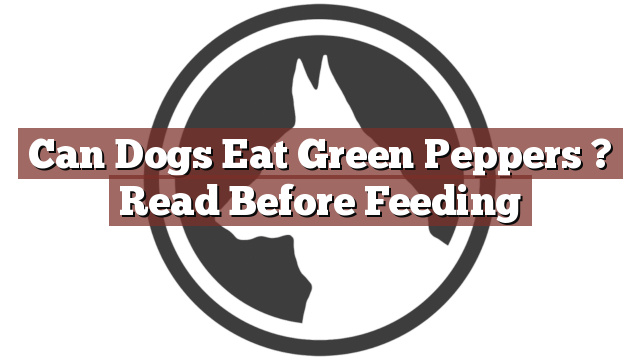Understanding Your Dog’s Dietary Needs
As a responsible pet owner, it is essential to know and understand your dog’s dietary needs. While dogs are primarily carnivorous, they can benefit from certain fruits and vegetables in moderation. However, it is crucial to be aware that not all human foods are safe for dogs to consume. Understanding what foods are suitable for your furry friend can help maintain their overall health and well-being.
Can Dogs Eat Green Peppers? Read Before Feeding
Can dogs eat green peppers? This is a common question that many dog owners may have. The answer is yes, dogs can eat green peppers in moderation. Green peppers are an excellent source of vitamins A, C, and K, as well as dietary fiber. These nutrients can provide various health benefits for your dog, such as boosting their immune system and promoting good digestion. However, it is important to remember that moderation is key, and green peppers should only be given as an occasional treat.
Pros and Cons: Feeding Green Peppers to Your Dog
Feeding your dog green peppers can have both pros and cons. On the positive side, green peppers are low in calories and fat, making them a healthy snack option for dogs that are on a weight management program. Additionally, the high fiber content in green peppers can contribute to better digestion and help prevent constipation in dogs.
However, there are a few considerations to keep in mind before feeding green peppers to your dog. Some dogs may have difficulty digesting peppers, leading to digestive upset or diarrhea. It is also important to remove the seeds and stem before giving your dog a green pepper, as these parts can be a choking hazard or cause gastrointestinal blockage.
Conclusion: Considerations for Feeding Green Peppers to Your Dog
In conclusion, green peppers can be a healthy addition to your dog’s diet when given in moderation. Before introducing green peppers or any new food into your dog’s diet, it is always best to consult with your veterinarian. They can provide personalized advice based on your dog’s specific needs and health conditions.
Remember to remove the seeds and stem from the green pepper and cut it into small, bite-sized pieces to prevent choking. If you notice any adverse reactions such as vomiting or diarrhea after feeding your dog green peppers, it is recommended to discontinue this treat and consult your veterinarian.
Understanding your dog’s dietary needs and making informed choices about the foods you offer can contribute to their overall health and happiness. With proper moderation and precautions, green peppers can be a safe and nutritious addition to your dog’s diet.
Thank you for taking the time to read through our exploration of [page_title]. As every dog lover knows, our furry friends have unique dietary needs and responses, often varying from one canine to another. This is why it's paramount to approach any changes in their diet with caution and knowledge.
Before introducing any new treats or making alterations to your dog's diet based on our insights, it's crucial to consult with a veterinarian about [page_title]. Their expertise ensures that the choices you make are well-suited to your particular pet's health and well-being.
Even seemingly harmless foods can sometimes lead to allergic reactions or digestive issues, which is why monitoring your dog after introducing any new food item is essential.
The content provided here on [page_title] is crafted with care, thorough research, and a genuine love for dogs. Nevertheless, it serves as a general guideline and should not be considered a substitute for professional veterinary advice.
Always prioritize the expert insights of your veterinarian, and remember that the health and happiness of your furry companion come first.
May your journey with your pet continue to be filled with joy, love, and safe culinary adventures. Happy reading, and even happier snacking for your canine friend!

